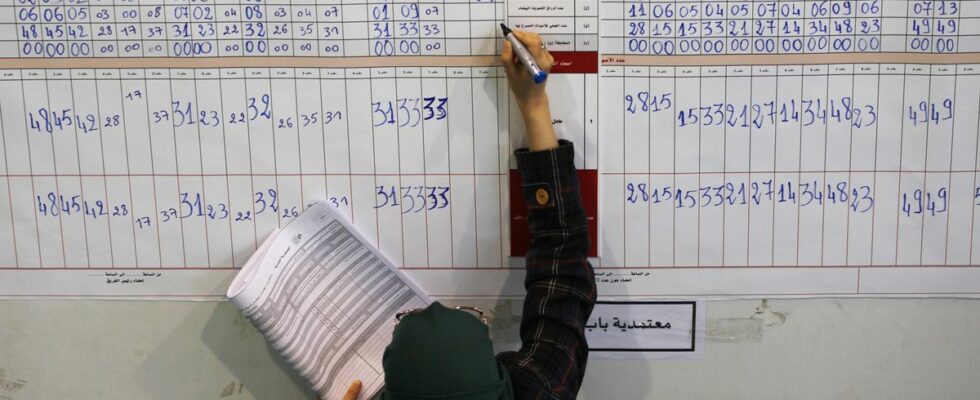The popular legitimacy of the Tunisian president is collapsing. The legislative elections organized this weekend in Tunisia met with massive abstention which undermines the legitimacy of the ultra-presidentialist system built by Kais Saied for a year and a half. Even if the head of state is not directly threatened by a divided and discredited opposition, opponents of the FSN and the influential Free Destourian Party (PDL, anti-Islamist) of Abir Moussi are calling for his departure. Update on the consequences of this electoral debacle.
How to explain such a debacle?
The participation rate of barely 9% crowns a campaign without real debate. The 1,055 candidates were mostly unknown with less than 12% women. Importantly, they were prohibited from displaying any political affiliation. Almost all parties, considering themselves marginalized, boycotted the election.
Unlike the one elected after the 2011 revolution, the new Assembly of Deputies will be devoid of real powers. Under a new Constitution, passed this summer, she will not be able to dismiss the president and will hardly be able to censure the government.
The main block of opponents, the National Salvation Front (FSN), united around the Islamist-inspired movement Ennahdha, denounced an “authoritarian drift” in the only democracy that emerged from the Arab Spring.
How will the president react?
“This represents a very big disappointment because Kais Saied was counting on the will of the people” which he has claimed since his coup of July 25, 2021, notes analyst Abdellatif Hannachi. Elected by more than 70% in October 2019, the head of state left the presidential palace, before the ballot, to inaugurate highways or comfort the inhabitants of poor neighborhoods. “He campaigned on the grounds that he was popular but the results do not confirm it,” said Abdellatif Hannachi. “Its popular legitimacy is collapsing,” adds political scientist Hamadi Redissi.
Opponents of the FSN and the influential Free Destourian Party (PDL, anti-Islamist) of Abir Moussi are demanding the departure of Kais Saied. But there is “no mechanism to force him to leave”, emphasizes Hamadi Redissi. Youssef Chérif, of the Columbia Global Center, sees “badly the president resigning or even recognizing the failure of these elections”. Even after the very low score for the referendum on the Constitution this summer (30.5% participation), he “always refused to admit defeat”, he underlines. And “as he did everything to restore the presidential system that existed before 2011, the legislative elections are marginal in his eyes”.
What can his opponents do?
The opposition is divided into three blocks: the FSN around Ennahdha, the left parties and the PDL, the cleavage being due to the role of Ennahdha, according to experts, majority formation in Parliament for ten years to which many Tunisians attribute the economic and social woes of the country. Demonstrations against Kais Saied’s “coup d’etat” brought together a maximum of 6,000 or 7,000 people and are becoming rarer. “The alternative they represent does not mobilize people,” underlines Abdellatif Hannachi, for whom Saturday’s abstention is the expression of “a disgust for the political class”.
During the 2011 revolution that toppled dictator Zine El Abidine Ben Ali, “people were optimistic and then they hated the behavior of the parties,” he says. “There is a growing gap between citizens and politicians,” confirms Youssef Cherif.
The powerful UGTT trade union center is one of the few players capable of bringing people to the streets. “Only an obviously undesirable economic collapse could unblock the situation,” said Hamadi Redissi. Tunisia is plunged into crisis, aggravated by the war in Ukraine, with inflation nearing 10% and growing poverty.
What is the position of Westerners?
Kais Saied had promised foreign partners “a roadmap and it has been implemented”, emphasizes Abdellatif Hannachi. The United States, very critical until then of the reforms of Kais Saied, described Sunday the legislative elections as “the first essential step towards the restoration of the democratic trajectory of the country”.
This foreign support is crucial for a highly indebted Tunisia which has asked the IMF for a loan of around 2 billion dollars, itself conditioning other aid, from Europe or the Gulf countries. The international community is pragmatic with regard to Tunisia, given the regional situation and “given the problems of immigration and the conflict between the Sino-Soviet bloc and the American-European bloc”, believes Hamadi Redissi.

